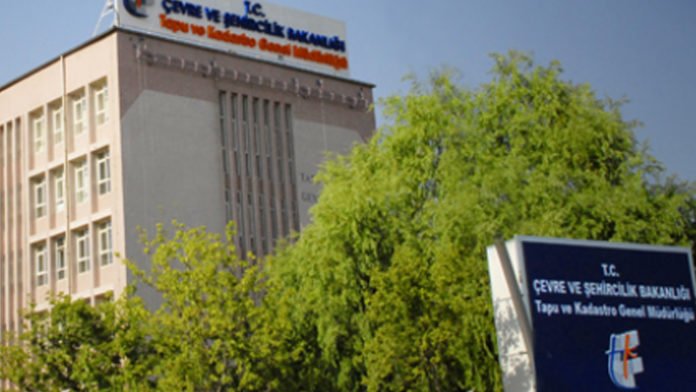Turkey’s Land Registry and Cadastre Directorate General bypassed the judiciary to seize the assets of critics of President Recep Tayyip Erdoğan, a circular communiqué obtained by Nordic Monitor has revealed.
The document has confirmed that plundering the assets and properties of Erdoğan critics has become so blatant that not even a court order is sought to carry it out, and local agencies have conducted such activities in accordance with the instructions from Ankara.
A circular communiqué, dated October 4, 2016, from the General Directorate of Land Registry and Cadastre (Tapu ve Kadastro Genel Müdürlüğü) ordered its branches across the country to block the transfer of properties belonging to alleged members of the Gülen movement, a religious group inspired by Muslim cleric Fethullah Gülen, upon requests received from the Ministry of Finance, governors, district governors and the police.
The document, signed by then-Deputy Director General Gökhan Kanal, urged local branches to add notes into the online “Risk Notification and Inquiry Screen” about whom the finance ministry, governors, district governors and the police sent official reports to in order to block the transfer of their assets. The communiqué revealed that those activities were launched following requests from administrative authorities and bypassed the judicial process.
Turkish President Recep Tayyip Erdoğan has been targeting followers of the Gülen movement since the corruption investigations of December 17-25, 2013, which implicated then-Prime Minister Erdoğan, his family members and his inner circle.
Dismissing the investigations as a Gülenist coup and conspiracy against his government, Erdoğan designated the movement as a terrorist organization and began to target its members. Erdoğan intensified the crackdown on the movement following a coup attempt on July 15, 2016 that he accused Gülen of masterminding. Gülen and the movement strongly denies involvement in the abortive putsch or any terrorist activity. Following the allegations, he called on the Turkish government to allow for an international investigation.
After the coup attempt, the directorate general created the “Risk Notification and Inquiry Screen” in order to detect alleged members of the movement. While private properties were blocked in the Land Registry and Cadastre Information System (TAKBİS), premises belonging to universities, preparation courses, dormitories, schools, foundations and associations were transferred to the General Directorate of Foundations and the Treasury.
Nordic Monitor previously reported on a circular from the Anti-Smuggling and Organized Crime Department (KOM) of the Turkish police ordering its local branches to swiftly confiscate those properties without awaiting a court order and then apply to a court to legalize the action. Turkish authorities consider Article 17 of Law No: 5549 Regarding the Prevention of Laundering Proceeds of a Crime as the legal basis for such actions.
“In cases where there is strong suspicion that the offenses of money laundering and financing of terrorism are committed, the assets may be seized in accordance with the procedure stipulated in Article 128 of Code of Criminal Procedure Law No. 5271. The public prosecutor may also make seizure decisions in urgent cases. A seizure carried out without a judicial decision shall be submitted for the approval of a judge on duty within 24 hours at the latest. The judge shall decide whether it will be approved or not in 24 hours at the latest. The decision of the public prosecutor’s office shall be invalid in the event of non-approval,” Article 17 states.
The article clearly states that a confiscation decision can only be given by a court, and only if there is a strong possibility that it may be too late if the arrival of a court order is awaited can a prosecutor impose a provisional seizure that must be taken to a court for review within the course of a day. However, transfer blocking, seizure and confiscation decisions included neither court orders nor prosecutor involvement.
Critics of the Erdoğan government, especially members of the Gülen movement, have been facing surveillance, harassment, threats of death and abduction since 2014, when then-Prime Minister and now President Erdoğan decided to scapegoat the group for his own legal troubles.
In the aftermath of the coup attemp, the assets and wealth of individuals, corporations and organizations that were seen as affiliated with the movement were branded as war spoils open to plunder. The assets of Gülen-affiliated entities such as schools, universities, media outlets, companies and apartment buildings were confiscated or stolen by their new owners. Similar to Nazi Germany, their property was divided up among Erdoğan’s Islamists and their collaborators.
Turkey’s Savings Deposit Insurance Fund (TMSF) has taken over 885 private companies including major conglomerates such as Boydak Holding, the Koza Ipek Group, Kaynak Holding, Naksan Holding, Suvari Co, Dumankaya, Akfa, Orkide and Sesli, valued at close to $11 billion. No figures are available verifying how much personal wealth and how many assets were seized through the Erdoğan government’s use of the partisan judiciary.















